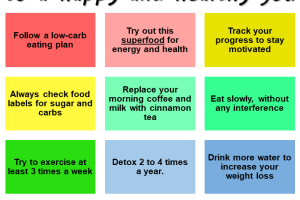5 Essential Tips for Maintaining a Healthy Lifestyle with Sandee

In today’s fast-paced world, the importance of maintaining a healthy lifestyle cannot be overstated. Many individuals find themselves with busy schedules, often prioritizing work and responsibilities over their health. However, understanding the significance of a balanced lifestyle can lead to lasting benefits, such as improved physical well-being, mental clarity, and overall happiness.
- 5 Essential Tips for Maintaining a Healthy Lifestyle with Sandee
- The Need for Balance
- Importance of Maintaining a Healthy Lifestyle
- Physical Health Benefits
- Mental and Emotional Well-being
- Tip 1: Balanced Diet
- Include a Variety of Nutrient-Rich Foods
- Tip 2: Regular Exercise Routine
- Incorporating Cardio and Strength Training
- Tip 3: Sufficient Hydration
- The Importance of Staying Hydrated
- Tip 4: Prioritizing Mental Health
- The Significance of Mental Well-being
- Tip 5: Adequate Rest and Sleep
- The Impact of Sleep on Health
The Need for Balance
Reflecting on personal experiences, many can recall times when neglecting their health led to exhaustion and stress. It’s easy to fall into the trap of convenience—grabbing fast food on the go or skipping workouts for late-night work sessions. Yet, these habits only pave the way for more significant health issues in the long run. Consider these factors for maintaining a healthy lifestyle:
- Physical health: Reduces the risk of chronic diseases.
- Mental health: Aids in stress management and enhances emotional resilience.
- Energy levels: Boosts productivity and motivation throughout the day.
It’s never too late to make healthier choices. Whether it’s choosing a nutritious meal option or setting aside time for exercise, small changes can lead to remarkable transformations. As we dive into practical tips for embracing a healthier lifestyle, keep in mind that every step counts, no matter how small. Get ready to embark on a journey of wellness and vitality!
Importance of Maintaining a Healthy Lifestyle
As we transition into understanding the benefits of a healthy lifestyle, it’s crucial to recognize that the choices we make today lay the groundwork for our future well-being. Adopting a healthy lifestyle goes beyond just physical appearance; it impacts how we feel and function daily.
Physical Health Benefits
One of the most immediate benefits of maintaining a healthy lifestyle is improved physical health. Many can relate to a time when they felt sluggish after a week of poor eating or lack of exercise. Making conscious choices leads to:
- Better weight management: Helps to prevent obesity-related diseases.
- Enhanced immune function: Boosts resilience against illnesses.
- Increased energy levels: Fuels productivity and engagement throughout the day.
Mental and Emotional Well-being
Additionally, a healthy lifestyle significantly contributes to mental health, providing clarity and focus. Picture this: after switching to a balanced diet and regular exercise, it’s common to feel more energized and less stressed.
- Stress reduction: Regular physical activity produces endorphins that act as natural mood lifters.
- Improved sleep quality: Increased physical activity helps regulate sleep patterns.
In essence, prioritizing a healthy lifestyle enhances overall well-being. Embracing this journey not only transforms physical capabilities but also nurtures mental resilience. With that foundation, let’s explore practical tips to help incorporate healthier habits into daily routines.
Tip 1: Balanced Diet
With a solid understanding of the importance of maintaining a healthy lifestyle, the first step toward achieving this is embracing a balanced diet. A balanced diet does not simply mean cutting out junk food; rather, it’s about incorporating a variety of nutrient-rich foods that nourish the body and satiate the palate.
Include a Variety of Nutrient-Rich Foods
Many people have found that the key to enjoying a healthy diet lies in variety. Picture your plate not just as a space for food but as a palette of colors. A well-rounded meal includes colorful vegetables, lean proteins, whole grains, and healthy fats. Here’s a simple breakdown:
- Fruits and Vegetables: Aim for a mix of colors. For example, kale, bell peppers, carrots, and berries provide essential vitamins and minerals.
- Lean Proteins: Including options like chicken, fish, beans, and tofu can help repair tissues and support muscle growth.
- Whole Grains: Foods like brown rice, quinoa, and oats are excellent for sustained energy and digestive health.
To make it even easier, consider creating a meal plan that incorporates these elements. Not only does this help in organizing meals for the week, but it also encourages trying new recipes. For instance, a stir-fry with colorful veggies and a protein source can be both delicious and fulfilling. By diversifying food choices and focusing on nutrient-dense options, individuals can enhance their overall health, boost their energy, and feel more vibrant each day. Now, let’s look at how incorporating a regular exercise routine can complement this balanced diet.
Tip 2: Regular Exercise Routine
Building on the foundation of a balanced diet, the next essential step in maintaining a healthy lifestyle is establishing a regular exercise routine. Just like nourishing the body with the right foods, physical activity plays a crucial role in enhancing overall well-being.
Incorporating Cardio and Strength Training
Many individuals have experienced the invigorating rush of endorphins after a good workout. Combining both cardio and strength training offers comprehensive benefits that support physical and mental health.
- Cardiovascular Exercise: Activities like running, cycling, or swimming elevate heart rates and improve circulation. This type of exercise is great for burning calories, reducing stress, and increasing endurance.
- Strength Training: Incorporating weights, resistance bands, or body-weight exercises like push-ups and squats builds muscle mass and boosts metabolism. Strength training also helps with functional movements, making daily tasks easier.
For beginners, a simple weekly routine might look like this:
| Day | Activity |
|---|---|
| Monday | 30 minutes of jogging |
| Wednesday | 20 minutes of HIIT (High-Intensity Interval Training) |
| Friday | Strength training focusing on major muscle groups |
| Saturday | Yoga or stretching |
Maintaining consistency is key. Finding a workout partner or setting specific goals can increase motivation. When individuals integrate both cardio and strength training into their routines, they not only enhance their physical fitness but also cultivate a sense of achievement and empowerment. Let’s transition to the next vital aspect of a healthier lifestyle: ensuring proper hydration.
Tip 3: Sufficient Hydration
As we continue our journey toward a healthier lifestyle, let’s not overlook the critical role of hydration. Water is often underappreciated; however, it is the lifeblood of our bodies, influencing our physical health, energy levels, and even mood.
The Importance of Staying Hydrated
Think about how you feel after a long day without hydration—drained, unfocused, and just off. Many individuals have experienced the significant difference that adequate water intake can make. Staying properly hydrated is key to optimizing physical performance and cognitive function. Here are essential reasons to prioritize hydration:
- Improved Digestion: Proper hydration aids in the efficient processing of food and prevents issues such as constipation.
- Increased Energy: Even mild dehydration can lead to fatigue and decreased productivity.
- Enhanced Skin Health: Well-hydrated skin looks healthy and radiant, contributing to a fresh appearance.
Aiming for around eight 8-ounce glasses of water a day is a popular guideline, but individual needs can vary. To make it easier, consider these strategies:
- Carry a Reusable Water Bottle: Keeping water within reach serves as a reminder to drink throughout the day.
- Infuse Your Water: Add fruits like lemon, cucumber, or mint for a refreshing twist.
By prioritizing sufficient hydration, individuals can experience increased vitality and better performance in both exercise and daily tasks. Next, let’s explore the importance of prioritizing mental health as a cornerstone of overall wellness.
Tip 4: Prioritizing Mental Health
Transitioning from the hydration discussion, it’s essential to highlight that physical health and mental health are deeply interconnected. Prioritizing mental health is not just beneficial; it’s crucial for maintaining a truly healthy lifestyle.
The Significance of Mental Well-being
Consider how stress and anxiety can impact physical health. For many, moments of stress bring about fatigue, irritability, or even physical symptoms like headaches. By focusing on mental wellness, individuals can enhance resilience and improve their overall quality of life. Here are some key practices to incorporate:
- Mindfulness and Meditation: Just a few minutes of meditation daily can help clear the mind and foster a sense of peace.
- Journaling: Writing down thoughts and feelings provides a safe space for self-reflection and can aid in processing emotions.
- Social Connections: Spending time with loved ones, whether in person, over the phone, or through video calls, can uplift spirits and foster a sense of belonging.
Creating balance is vital. Rather than feeling overwhelmed by the demands of life, making time for self-care activities helps rejuvenate the mind. For instance, one might dedicate Sunday afternoons to outdoor walks or reading favorite books as a form of therapy. By prioritizing mental health, individuals create a more robust foundation for a healthy lifestyle. This sets the stage for the final essential tip: the importance of adequate rest and sleep.
Tip 5: Adequate Rest and Sleep
Having discussed the importance of mental health, it’s time to turn our attention to another fundamental aspect of a healthy lifestyle: adequate rest and sleep. Often underestimated, quality sleep is vital for rejuvenating both the body and mind.
The Impact of Sleep on Health
Many individuals have felt the effects of a restless night—grogginess, irritability, and difficulty concentrating are just a few signs of sleep deprivation. When the body doesn’t get enough rest, it can lead to various health issues, from weakened immunity to increased stress levels. Here’s why prioritizing sleep is crucial:
- Physical Recovery: Sleep is when the body repairs tissues, builds muscle, and regulates hormones.
- Cognitive Function: A well-rested mind improves memory, creativity, and decision-making skills.
- Emotional Balance: Quality sleep helps regulate emotions and reduces anxiety.
To ensure adequate rest, consider these strategies:
- Establish a Consistent Sleep Schedule: Going to bed and waking up at the same time each day helps regulate the body’s internal clock.
- Create a Relaxing Bedtime Routine: Activities such as reading, meditating, or taking a warm bath can signal to the body that it’s time to wind down.
- Limit Screen Time Before Bed: Reducing exposure to screens can help improve sleep quality by decreasing blue light exposure.
By making sleep a priority, individuals can enhance their overall well-being and feel more equipped to handle daily challenges. With a focus on sleep, hydration, mental health, and physical activity, achieving a balanced and healthy lifestyle becomes an attainable reality.





